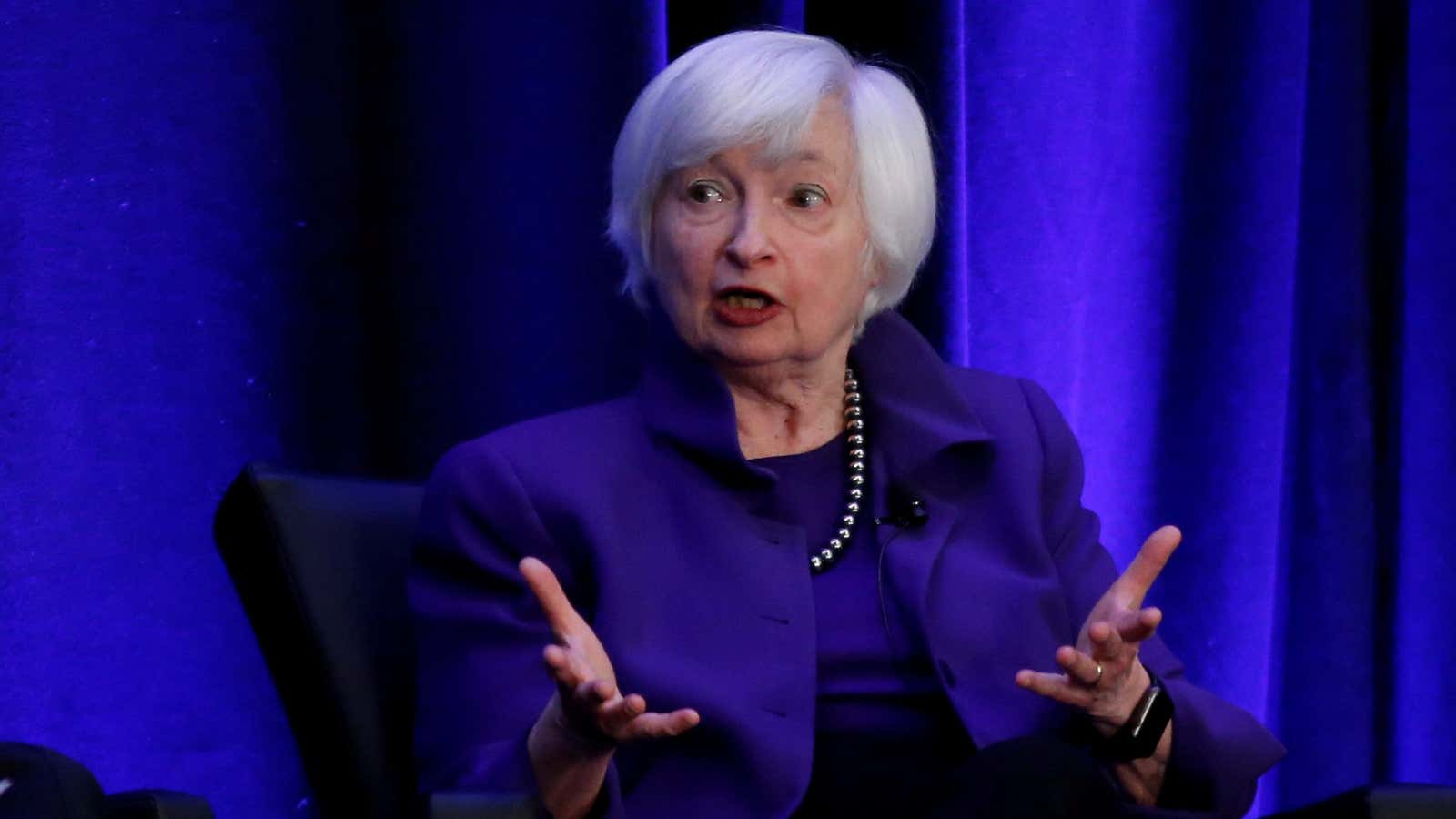US president-elect Joe Biden’s pick for treasury secretary, economist and former Federal Reserve chair Janet Yellen, has been vocal about her support for carbon taxing.
Yellen is a founding member of the Climate Leadership Council, an international policy institute with a stated mission to tax carbon as a way of reducing greenhouse gas emissions. The group is backed by energy companies including BP, ExxonMobil, and Shell.
“I do see Republican support, and not only Democrat support, for an approach that would involve a carbon tax with redistribution. It’s not politically impossible,” Yellen told Reuters in an interview in October.
The plan (pdf) supported by Yellen proposes an initial carbon tax of $40 per metric ton, with a yearly increase of 5%. If implemented in 2021, it could cut US carbon dioxide emissions in half by 2035. The initiative would funnel the revenues back to households through equal, lump-sum dividends amounting to about $2,000 per year for a family of four.
Carbon pricing is gaining popularity around the globe, and it’s likely to become a talking point soon in Washington. Here’s a quick refresher on what it is, and which countries are already on board.
What is a carbon tax?
Carbon taxing is a policy that imposes a fee on carbon dioxide emissions, usually by the metric ton. The strategy aims to reduce planet-warming emissions by making them costly.
There tend to be two forms of carbon tax: those that tax the quantity of emissions produced, and those that tax goods and services that are greenhouse gas-intensive, like gasoline.
Carbon taxation is one of two main policy strategies for pricing carbon. The other is called emissions trading schemes (ETS), also known as ‘cap and trade’. Oftentimes there is confusion around these terms, and it’s common to find ETS referred to as a carbon tax.
How do carbon taxes work?
Setting a carbon tax requires consideration of a number of factors:
⛽️ Who will be taxed? The tax can be imposed anywhere along the energy supply chain. Will the tax be levied on the suppliers or on the consumer?
💰 What will the amount be? What will the tax be set at, and will there be an increase in that rate over time? An increasing price can signal urgency and encourage those being taxed to make more aggressive changes to reduce emissions.
⚡️ Who will be impacted? Lower-income households tend to spend a larger share of their income on energy, meaning a carbon tax that increases energy costs would disproportionately affect the poor.
🌍 Where will the revenues go? Money raised by the tax can be used in a number of ways. One option is to return all or part of the funds to the public. Alternatively, the money could be invested in climate funds or resilience schemes.
Which countries have carbon pricing?
Forty-six countries have some form of national carbon pricing plan, according to the World Bank. These initiatives cover nearly 20% of global greenhouse gas emissions.
The US doesn’t have a federal carbon pricing plan, but there are a handful of state-level initiatives. None of the regional initiatives are carbon taxes; they’re all emissions trading schemes.
Which country has the highest carbon tax?
Sweden taxes carbon emissions at $119 per metric ton, which is the highest in the world, according to the World Bank (pdf). Mexico’s lower limit, Poland, and Ukraine are the lowest carbon taxes at less than $1.
While it is informative to contrast the spread of prices between countries and policies, it should be noted that making direct comparisons can be tricky. Plans may differ by the industries and sectors they cover, how the fees are allocated, and whether or not there are specific exemptions.
Are carbon taxes effective?
Economists have enthusiastically backed the idea of pricing carbon for years. If you give companies a monetary incentive to reduce their emissions, they’ll do it. Or so the theory goes. And both researcher models and real-world examples confirm its efficacy. However, in practice, carbon taxes are a supporting player, and policies other than carbon pricing are still driving the majority of emissions reductions. Why is this?
🛢 Limited coverage. Only 20% of global emissions are covered by some form of carbon pricing.
📉 Low prices. Of those countries that do implement carbon pricing, most have fees that are set too low to have any significant impact on reducing emissions.
🗳 Political popularity. Carbon pricing isn’t popular with voters, as the fees often end up reflected in their own day-to day spending via increased utility bills, or hikes in gasoline prices. This keeps fees low, or prevents carbon taxes from becoming law altogether.
Ultimately, carbon pricing, whether in the form of a tax or as a cap and trade scheme, is a useful tool for policy makers looking to reduce harmful greenhouse gases. However, it hasn’t proven to be enough on its own.
